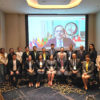His Excellencies: Ms. Jovita Corpuz, Executive Director of the Philippines Agricultural Credit Policy Council, and President of APRACA CENTRAB Dr. Sung-Hoon Kim, Former Agricultural Minister of Korea Republic Mr. Won-Sik Noh, APRACA Secretary General Mr. Ralph Houtman, Marketing and Rural Finance Officer of FAO Mr. Benedicto S. Bayaua, Former APRACA Secretary General, and Consultant of
His Excellencies:
Ms. Jovita Corpuz, Executive Director of the Philippines Agricultural Credit Policy Council, and President of APRACA CENTRAB
Dr. Sung-Hoon Kim, Former Agricultural Minister of Korea Republic
Mr. Won-Sik Noh, APRACA Secretary General
Mr. Ralph Houtman, Marketing and Rural Finance Officer of FAO
Mr. Benedicto S. Bayaua, Former APRACA Secretary General, and Consultant of APRACA-IFAD Finpower Program
Honorable Members of APRACA Executive Committee
Esteemed Members of APRACA
Honorable Executive Directors, Presidents, Managing Directors…
Dear Guests
Ladies and Gentlemen
Good Morning:
On behalf of the large family of Bank Keshavarzi, I would like to express my heartfelt appreciation for your presence in the
60th APRACA Executive Committee meeting
Forum on Finance toMeet the Challenges of Environmental Change
and
APRACA Finpower CEO Policy Forum on Microfinance
and welcome you, all our dear guests from other countries to the Islamic Republic of Iran.
I am pleased to wish all our guests fruitful participation in APRACA events and pleasant stay here in Tehran and the historical city of Isfahan.
All my colleagues in Bank Keshavarzi, the green bank of Iran, have striven and done their best to make all APRACA delegates have memorable time during their stay in Iran and be able to exchange experiences with other participants during the two-day forum.
During the meetings, speakers will share different issues and experiences with the audience and I am assured that all participants will be furnished with appropriate opportunities to exchange information and specialized knowledge.
Ladies and Gentlemen:
We all know that within the next decade, i.e. 2011-2021, the fundamental trends will affect the global agriculture, and food production subsequently. Thus, the agriculture sector in most of the member countries of APRACA will be facing variety of challenges, such as the growing rate of population in developing and less-developed countries; intense pressure on natural resources including water resources, lands, and forests; and the rise of energy prices, which will significantly increase the marginal cost of agricultural products and foodstuffs. Another important challenge is the issue of environmental and climatic changes, which interfere with accessibility to resources required for the growth of the agriculture sector. Thus, such challenges and the ways to confront them have appropriately been chosen as the topics of the first day forum.
Since one of the main objectives of APRACA is to foster cooperation in improving and planning the financial arrangements for rural and agricultural development, it is highly important to establish a systematic relationship, among the members, for interchange of information and expertise aimed at offering sustainable rural and agricultural financial services.
It is noteworthy that holding such event focusing on environmental changes on the first day and rural and agricultural finance as well as the microfinance policies on the second day, will definitely provide the groundwork for thorough and systematic perception of these challenges and affecting trends, from different aspects, by all APRACA members. Moreover, it is to be noted that to promote preparation to confront such challenges, some initiatives including the accurate anticipation of urban population growth rate, identification of factors involved in urbanization and immigration to urban areas, study of changes and choice of suitable strategies for rural development, and effective finance by APRACA, must be taken into close consideration.
Ladies and gentlemen
I hope you agree with me that knowledge transfer and encouraging APRACA members to have more interactions with one another in terms of rural finance and making them epidemic among the members is one of the objectives of APRACA whereby it is possible only through interrelations between the members; that’s why Bank Keshavarzi is ready to extend its relation with Asian and non-Asian members of APRACA because this sort of cooperation will eventually lead to what has been stated in the mission and vision of APRACA.
Now, I would like to share with you the summary of the major achievements by Bank Keshavarzi:
Bank Keshavarzi is 78 years old. It was established in 1933 and since that time the main objective of the bank was to finance agriculture sector, especially in rural areas. Because of the frequency of farmers’ population, the share of employment in the sector, and the role and importance of crops in nutrition and food bundle of the population of Iran, Bank Keshavarzi, as the most significant state-owned financial institution, has always been at the center of attention by government and governing entities. During its 78 years of operation, the share of financing agriculture sector by Bank Keshavarzi has always been at least 60% which represents noticeable contributions of the bank by itself.
Distinguished guests
As of now, Bank Keshavarzi holds about 50 million accounts and the number of customer amounts to 44 million, and every year it disburses over 1.5 million kinds of facilities. During the last 4 years, the bank has developed its core banking system so that right now the whole 1906 branches are operating as a network. It is through such a platform that the new services of e-banking are presented to customers through channels including telephone banking, mobile banking, SMS banking, online banking, automated teller machines (ATM), points of sales (POS), and payment gateways.
Ladies and gentlemen,
Bank Keshavarzi has issued over three million Keshavarz cards (literally Farmer card), aiming to make the activities of farmers parallel with new banking. In addition, aiming to making the youth and kid age group bankable and familiar with banking process, and as the future customers of the bank, the youth and kid services of the group have been designed.
In this part of my speech, I should point out to developing the crop insurance operation along with developing other new banking services. Crop insurance dates back to 28 years ago in Iran, and I am pleased to announce that during the same period the number of products under the insurance of the bank has grown from 9 products to 130 products, that is, something about 1344 percent. At the same time, because of its special geographic and climatic status, Iran has always been exposed to natural hazards and disasters. Out of 40 well known natural disasters and hazards of the world, Iran has been facing with 31 of them which demonstrate how significant the task of Bank Keshavarzi is by itself to prevent and compensate for the damages incurred to the farmers.
Bank Keshavarzi has been attentive to diversifying its revenue resources all the time to finance agriculture sector in a way that it can act out successfully by participating in the marketplaces and monetary centers of the big cities of the nation and by offering proper services proportioned with the demands of the market such as Forex exchange services, opening LCs, stock brokering and trading services.
Other operations of the bank to diversify its income basket revolving around electronic services are as follows:
- Increasing the number of POSs from 123021 to 145000 within 2 years;
- Increasing the number of ATMs from 1372 to 1956 within 2 years;
- Increasing the number of bank- kiosks from 113 to 200;
Extension of the bank cards services, as follows:
- Young National Cards 650,734
- Iran cards (women allocated) 507,750
- Mehr Youth Cards 294.133
- Farmer Cards 3,651,242
Once again, I should emphasize on issuing more than 3 million Farmer Cards which make them familiar with new banking services much more and the method which make banking transaction less expensive than traditional ones .
Distinguished guests,
BK has played a significant role in agricultural microfinance since its establishment, because it has been granting micro credit facilities to farmers so that they could do some small economic activities like farming, horticulture, livestock and poultry, to name a few. With expansion of BK’s activities, microfinance activities have also expanded following a new approach. Accordingly, classifying its micro-customers, BK provides them with diverse micro-credit services. For example, executing Hazrat Zaynab plan, the bank has furnished employed rural household-headed women with small and short-term credit facilities secured with chained guarantees since 1994.
In addition to this plan, other plans are designed to present services to women groups by BK
Ladies and Gentlemen,
When I was a university student, there was a professor who used to repeat “What can be learned from these experiences?”. Now, if the experiences gained and such a successful performance can be useful for the members of APRACA, Bank Keshavarzi is ready to present them and in turn, benefit from their successful experiences.
In the end, I hope the meetings will be successful and provide all participants with effective results. Once more, I wish you a memorable stay in Tehran and Isfahan in advance.















